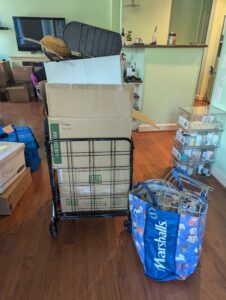Author: Sheri Denkensohn-Trott
Don’t get me wrong, I’m not trying to be a curmudgeon. But as I get older, I am not thrilled with the fact that the media, other people, and life in general focuses on “making resolutions.” It’s as if we are forced to look at our lives and think of what we want to do in the coming year that will be exciting, adventurous, push us forward,  and bring new things. There is nothing wrong with that. But I don’t like that it is imposed.
and bring new things. There is nothing wrong with that. But I don’t like that it is imposed.
Quite frankly when you go to bed on December 31, nothing magically changes at midnight. When you wake up in the morning, you’re in the same place, with the same people, in the same circumstance. It doesn’t mean that you haven’t been trying to change aspects of your life before December 31 or thought about what you want to do differently. So why do we have so much pressure to change everything when we wake up on January 1?
 My view is that it’s a good time for reflection. It’s always a good time to reflect on what I like about my life. What can I change? What is in my control and what isn’t? These are all good questions to ask. Certainly, we are all capable of making improvements and trying new things. Some of the new year will bring obstacles that we can’t even conceive of and great surprises; some good, some bad. That is the beauty of life, not knowing.
My view is that it’s a good time for reflection. It’s always a good time to reflect on what I like about my life. What can I change? What is in my control and what isn’t? These are all good questions to ask. Certainly, we are all capable of making improvements and trying new things. Some of the new year will bring obstacles that we can’t even conceive of and great surprises; some good, some bad. That is the beauty of life, not knowing.
On the flipside, many of us wake up knowing that we are faced with challenges that aren’t going away. We might be able to wish on a million candles, but sometimes our life situation dictates that we have certain obstacles that we have to deal with. Sure, we can learn how to deal with them differently and flip our perspectives, but that won’t make them go away. I don’t like the pressure of making some magic resolution that will change everything. I can choose to change my perspective, but I can’t change the facts.
The past year brought many highlights, especially my storytelling at the Capital Fringe Festival. I had never done three full days of storytelling. It was not easy, but I met wonderful people, had a great time, and pushed my abilities. We also moved. A great accomplishment but it was a lot of work. I feel good that I got rid of a lot of stuff, but I also realize that change is hard and we are just getting used to our new routine. So maybe that is why I feel the pushback of new resolutions.
There are some things I’d like to do in the new year and there are projects that I have to do that I’m not looking forward to. I don’t want to wake up on January 1 feeling like I must start to do it all. Step-by-step is the only way. And that is life. I resolve to take one step at a time and encourage all of you to do the same.

 mention in this blog don’t seem to be major problems or hassles to you, they are to me and I’m sure you can relate to the concept of things going wrong and snowballing.
mention in this blog don’t seem to be major problems or hassles to you, they are to me and I’m sure you can relate to the concept of things going wrong and snowballing. could call a locksmith but see the next item in the list of snowballing issues: “Trying to maintain a budget.” To make matters worse, a locksmith might not even be able to fix the scooter and my brand of scooter is not made anymore, so it’s not like a replacement is easily available.
could call a locksmith but see the next item in the list of snowballing issues: “Trying to maintain a budget.” To make matters worse, a locksmith might not even be able to fix the scooter and my brand of scooter is not made anymore, so it’s not like a replacement is easily available. Wheels maintains a modicum of happiness. Our latte machine certainly helps with that (even if I can’t make designs like the one pictured)! We are hoping that 2025 will bring changes that allow us to first fix the key or get another medical device and also add some fun adventures.
Wheels maintains a modicum of happiness. Our latte machine certainly helps with that (even if I can’t make designs like the one pictured)! We are hoping that 2025 will bring changes that allow us to first fix the key or get another medical device and also add some fun adventures.
 and figure out ways to work through it. These are tools that I have learned but employing them is the key. Sometimes it took longer than others, but I pushed through.
and figure out ways to work through it. These are tools that I have learned but employing them is the key. Sometimes it took longer than others, but I pushed through.